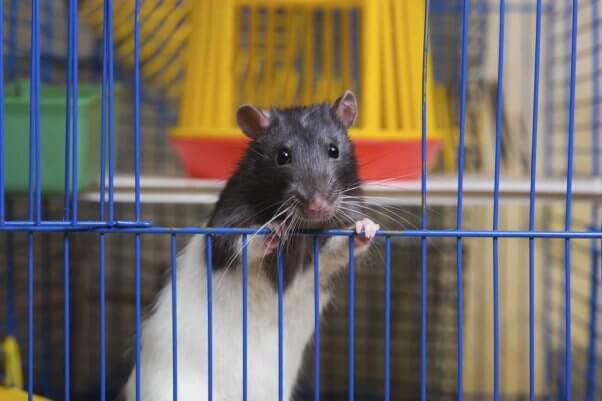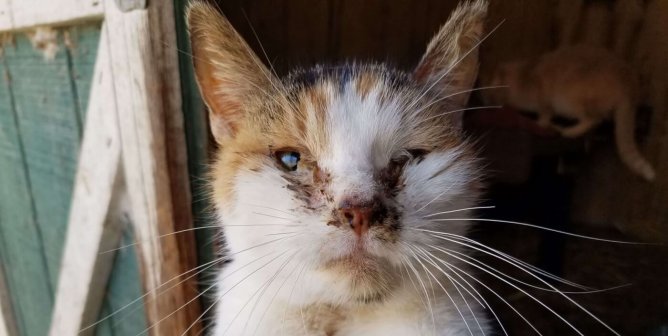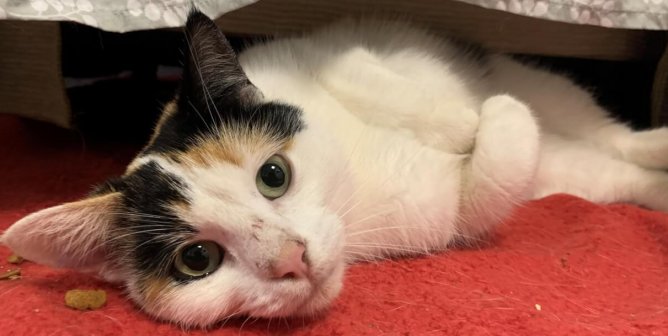Facts on Rats and Mice
Are rats and mice right for your family? Possibly, if you know a little about them before you decide to adopt.

Rats and mice are family-oriented, sensitive, empathetic animals. They speak to each other in squeaks and in high-frequency sounds that are inaudible to the human ear. They become emotionally attached to one other, love their families, and bond easily with their human guardians. Male mice woo their mates with high-pitched love songs, and infant rats giggle when they’re tickled. Not only do rats express empathy when another rat or a human who is familiar to them is in distress, they also exhibit altruism. Researchers found that a rat would save another rat from suffering even if he or she didn’t know the other animal and even if it meant having to share food. These animals will also willingly put themselves in harm’s way to save someone else. Rats and mice are intelligent and curious, and they make loyal companions for devoted guardians.
Breeders and Pet Stores
Just like dogs, mice and rats are supplied to pet stores by mass breeders, who aggravate the problem of these species’ overpopulation and their resulting abandonment and abuse. Shipped to distributors in small, cramped containers that are breeding grounds for parasites as well as viral and bacterial infections, they often reach pet stores ill, malnourished, and/or pregnant.
Small animals provide these stores with only a modest profit, and their deaths are considered a minor loss to the businesses. Their living conditions in the stores generally reflect this. You can commonly spot animals with discharge from the eyes or nose; rough, scaly tails; ruffled coats; hunched postures; listlessness; bloated stomachs; and dirty, damp mouths and anal areas. Frequent scratching is a sign of skin mites or fungal problems. Other warning signs of illness include sneezing, wheezing, thinness, broken teeth, blood or mucus in droppings, and diarrhea. If you purchase a mouse or a rat from a pet store, you may be acquiring a sick animal who will need immediate veterinary care. You can learn about the cruelty that PETA has repeatedly uncovered at PetSmart here and at Petco here.
Housing
Rats and mice are social butterflies. Ideally, they should live with a companion of their own species. But since they’re too small to be spayed or neutered, males and females can’t be housed together. And two males housed together will often fight. Two or more females will likely enjoy being together if they have adequate space. You can adopt just one male as long as you’re willing to spend time with him and give him extra care and attention.
Sleep Needs
Mice and rats are nocturnal, so those you adopt will likely be sleeping all day and making noise (running on their wheels, chewing, etc.) all night. If you have children, they may become frustrated when the animals aren’t awake to play, and—like all animals—mice and rats don’t enjoy being disturbed when they’re sleeping. So plan to spend some time playing with them late in the evening when everyone is awake. If your home isn’t usually quiet during the day and there’s no peaceful place for them to rest, you may want to rethink keeping them as companions. Like all animals, their health suffers when they’re deprived of sleep.
Veterinary Care
Prospective guardians of rats and mice should keep in mind that they do require veterinary care and that this can be as expensive as it is for cats and dogs. They’re very susceptible to upper respiratory infections (URIs), which are often fatal. If you notice that your animal is losing interest in food, toys, and spending time with you or is showing symptoms of illness, such as coughing, wheezing, labored breathing, excessive tiredness, or cloudy eyes, you’ll want to get him or her to a small-animal specialist or an emergency animal hospital as soon as possible to be checked for a URI. The vet can often prescribe a course of oral antibiotics, which will need to be administered every day. The visit and the antibiotics will likely cost upwards of $100, and the prescription may not always save the animal. It’s imperative that your companion get medical care as early as possible in order to have the best chance of survival. An animal must never be left to suffer from a URI. The infection is extremely painful, and animals won’t simply “get better” without medical care.

Basic Care
If you adopt rats or mice, you’ll need to provide them with a comfortable habitat that meets all their needs. Here are a few basic guidelines to follow:
- Wire enclosures are much healthier for mice and rats than aquariums, as they’re ventilated to allow fresh air in instead of trapping odors, they stay cooler, and they provide the animals with more contact and interaction with their surroundings. Some guardians use a standard cage left open inside a playpen or a similar larger enclosure to leave room for the animals to explore, climb, play with toys, and run.
- Cover the floor of the enclosure with bedding at least an inch thick to provide them with comfort and cleanliness and to allow for burrowing and nesting. Cedar and pine shavings are toxic to small animals, and the dust from them can cause URIs. Companies such as Carefresh make soft paper bedding that’s more comfortable than shavings, locks in moisture, and is nontoxic and dust-free.
- Mice and rats are sensitive to temperature extremes, so you’ll want to keep their habitats out of direct sunlight and away from air vents.
- They need constant access to fresh water and dry food that’s suitable for them. They also love most produce for treats and can eat nuts (except almonds) and grains. Avoid giving them cheese, milk, and other animal-derived “products.” You’ll want to clean their food dish daily and their water bottle before each refill.
- Because of their sensitive respiratory systems, they can’t be exposed to smoke. Similarly, don’t spray perfumes, cleaning products, or other airborne chemicals near them.
- Much like cats, mice and rats clean themselves. They don’t need to be bathed and wouldn’t enjoy it. Don’t bathe them unless your vet tells you otherwise.

- Their teeth grow constantly, so they need to chew to keep them from overgrowing. Shelled treats like pistachios and sunflower seeds give them a healthy way to do this, can be tasty treat rewards, and provide them with a fun way to stay engaged and entertained. Mineral blocks as well as wood and rice chews are also great for these purposes. Keep a couple of options handy so that your animals don’t get bored.
- They love to run on exercise wheels. Choose one that’s solid plastic and appropriate for their size. Wire wheels can hurt their feet, and they can fall through the gaps and be injured. They love to run at night, so if the wheel is too loud, apply a drop of olive oil to the brackets.
- Almost anything can be a fun toy for them: Try using paper towel and toilet paper rolls for tunneling, small balls, anything that they can climb, and tissue boxes and paper bags filled with bedding to allow them to burrow and hide their treats. Rats and mice are extremely smart and love to solve puzzles, too. Have fun with them by making puzzles for them to solve for a treat reward, and then watch them figure them out. You can put a treat inside a toilet paper roll and stuff paper into the ends, put a reward inside a paper bag and roll the top closed, ball up a piece of paper around a snack, hide a tempting morsel under only one of two small paper cups, and try anything else that you think they might enjoy.
- You can spot-clean droppings daily to help reduce the chance of illness, and once a week, you’ll need to clean out the whole cage. While you’re doing this, mice can explore your home in exercise balls that are suitable for their size, but rats shouldn’t be placed in these, because they can potentially cause back problems. The animals can also sit on a blanket on your sofa or bed while their home is being cleaned. Scoop and throw away all the bedding and food remnants from the floor of the habitat, and then wash the entire thing with soap and water. Don’t use spray cleaners, as the harsh chemicals can irritate animals’ delicate respiratory systems. Dry everything thoroughly before putting in new bedding and fresh food and water. It’s also nice to leave extra treats for the animals to find.

Bonding
It may take a while for mice and rats to become comfortable with stepping into your hand and being picked up and held. Start by laying your hand flat with a food treat in your palm. You may have to leave the treat in the habitat a few times before the animals approach your hand, but you’re still helping to create a positive association. When your animals walk into your hand to take the treat, don’t pick them up immediately, but give them time to feel comfortable first. Then slowly lift them to your chest to be gently petted. They may also enjoy sniffing your hands and face just like a cat or dog would, and this can be very cute (and ticklish). It’s rewarding to see them begin to trust you and run to you when you approach. You may also want to try letting them sit with you on your sofa or bed. Just spread an old blanket across the surface first, since they’re not aware of when they’re toileting, and keep an eye on them to make sure they don’t try to climb down. (Mice and rats don’t like to jump, so don’t worry about that.)
Adoption
If you’re ready to give mice or rats a loving and devoted permanent home, please don’t give your money to breeders, dealers, or pet stores. Your local humane societies likely have many of these animals who need families, and the Rat and Mouse Club of America’s (RMCA) Furry Friends Orphanage foster care program maintains units across the U.S. You can learn more about the group and its adoptable animals here.








